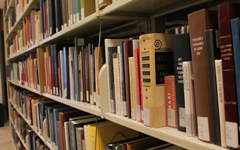
Georgetown University Library is home to more than 3 million books, 220,000 journals, almost 1,000 scholarly databases, and an extraordinary collection of primary sources and archival material—much of it available electronically. If there’s something you need that we don’t own, our interlibrary loan partnerships give us a way to get it for you. Our expert librarians can guide you through our collections and the research process as a whole.
Here's an overview of the Library can give your research a head start.
Finding Materials
- HoyaSearch is our main library catalog. It will help you find what you need in books, databases, journal and newspaper articles, datasets, streaming films, and our image and primary source collections. HoyaSearch also searches the collections of the Washington Research Library Consortium, a collaboration of university libraries in the D.C. area. If Georgetown doesn’t own a book but one of the other WRLC members does, you can request it through HoyaSearch.
- Our interlibrary loan service gives you access to an even broader collection of materials. If you can’t find what you need through the WRLC, submit requests of articles, book chapters, and ebooks through ILLiad. The Library’s Interlibrary Loan office can request materials from other libraries or digitize portions of print materials Georgetown owns and deliver them electronically.
- Have a request you still can’t find? The library can order materials on demand. Contact your research services librarian for assistance.
- Lean Library makes it easy to use paywalled databases and journals that the library subscribes to from anywhere, on campus or off. To use it, download the "Library Access" extension from Lean Library's website and install it in your preferred browser. Then select "Georgetown University Library" from the list of institutions, and click "Save."
- Find primary source materials, rare books, archival materials, artwork, and other unique resources in the Booth Family Center for Special Collections and on DigitalGeorgetown. DigitalGeorgetown houses more than half a million digital objects, from university archives to the National Equal Justice Library.
- Several specialized libraries are part of Georgetown University Library. The Bioethics Research Library offers access to premier collections of bioethics literature, including collections that explore issues from a variety of cultural and religious perspectives, and archival collections documenting the history of bioethics in the United States. Blommer Science Library houses 60,000 books and journals on biology, chemistry, computer science, mathematics, and physics. The SCS Library provides materials and services supporting the School of Continuing Studies, and Woodstock Theological Library contains one of the country’s premiere theological collections. Woodstock is currently closed, but materials housed there can be requested via HoyaSearch.
- The Bioethics Research Library's archival collections document the history of bioethics in the United States.
Research Help
- Have a question? Get reference help via chat, email, or phone from any of our libraries.
- Our research services librarians are experts who can guide you through the resources related to your field that the Library offers.
- Research consultations are available to give you one-on-one help with any research project. The SCS Library also provides research consultations to School of Continuing Studies faculty.
- Leverage digital tools to conduct and share your research. Our open workshops or one-on-one multimedia consultations will help you master digital mapping, data visualization, text mining, website creation, and more. The Library can also collaborate on a digital project with you—schedule a consultation to get started.
- The Library provides access to productivity, graphics, and subject-specific software, from ChemDraw Professional to ArcGIS to MatLab. Many programs installed on Library lab computers are also available for download and installation on personal computers; visit the Georgetown University Webstore to browse the full list of software available for free for Georgetown students, faculty, and staff. Also see the list of Recommended Software for Instructional Continuity, available for free or low cost on a trial basis during the pandemic.
- Our Research Guides are curated collections of information highlight the major databases, journals, statistical sources and more to get you up to speed on any topic from climate change to sports management. We also create guides for specific classes, how-to guides to aid in developing valuable skills, guides to notable library collections, and video tutorials on a variety of topics.
